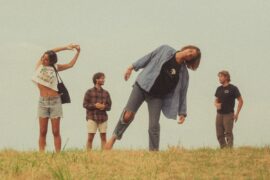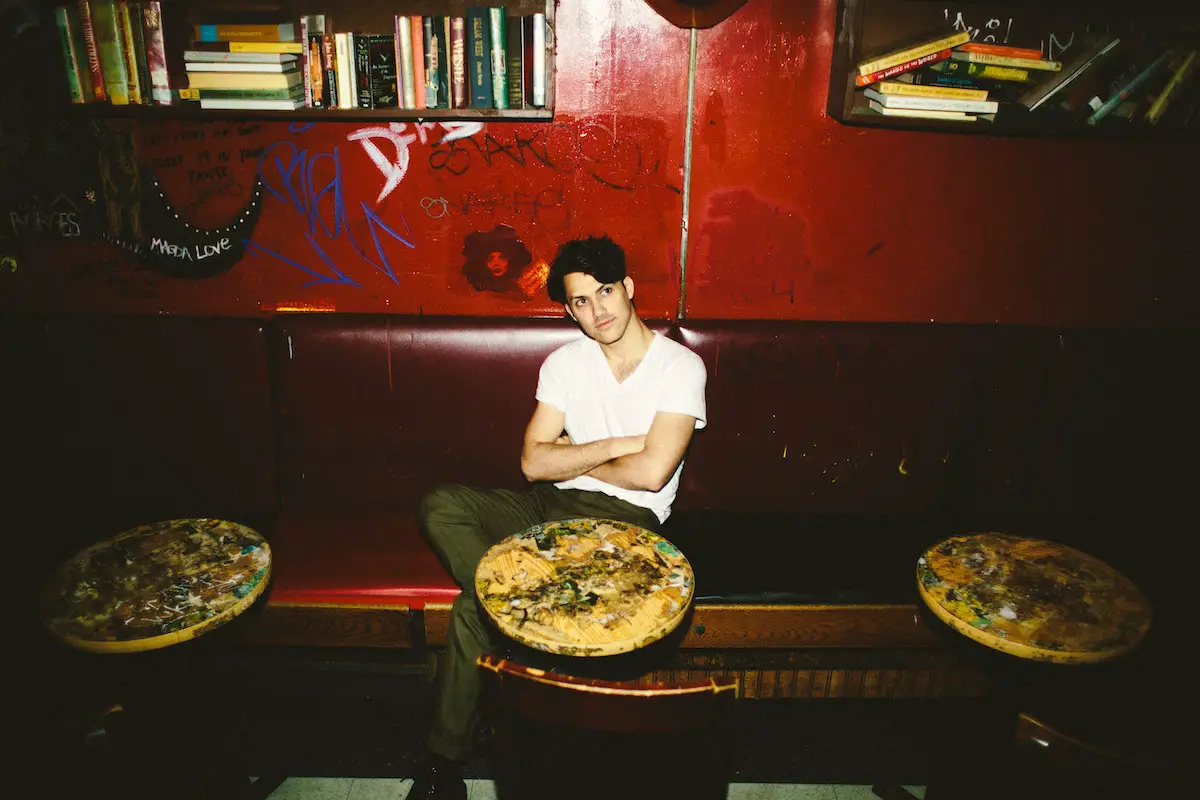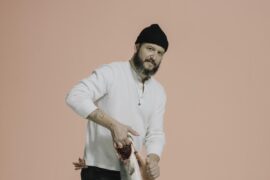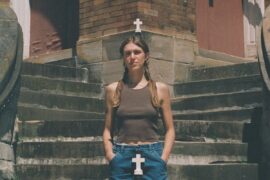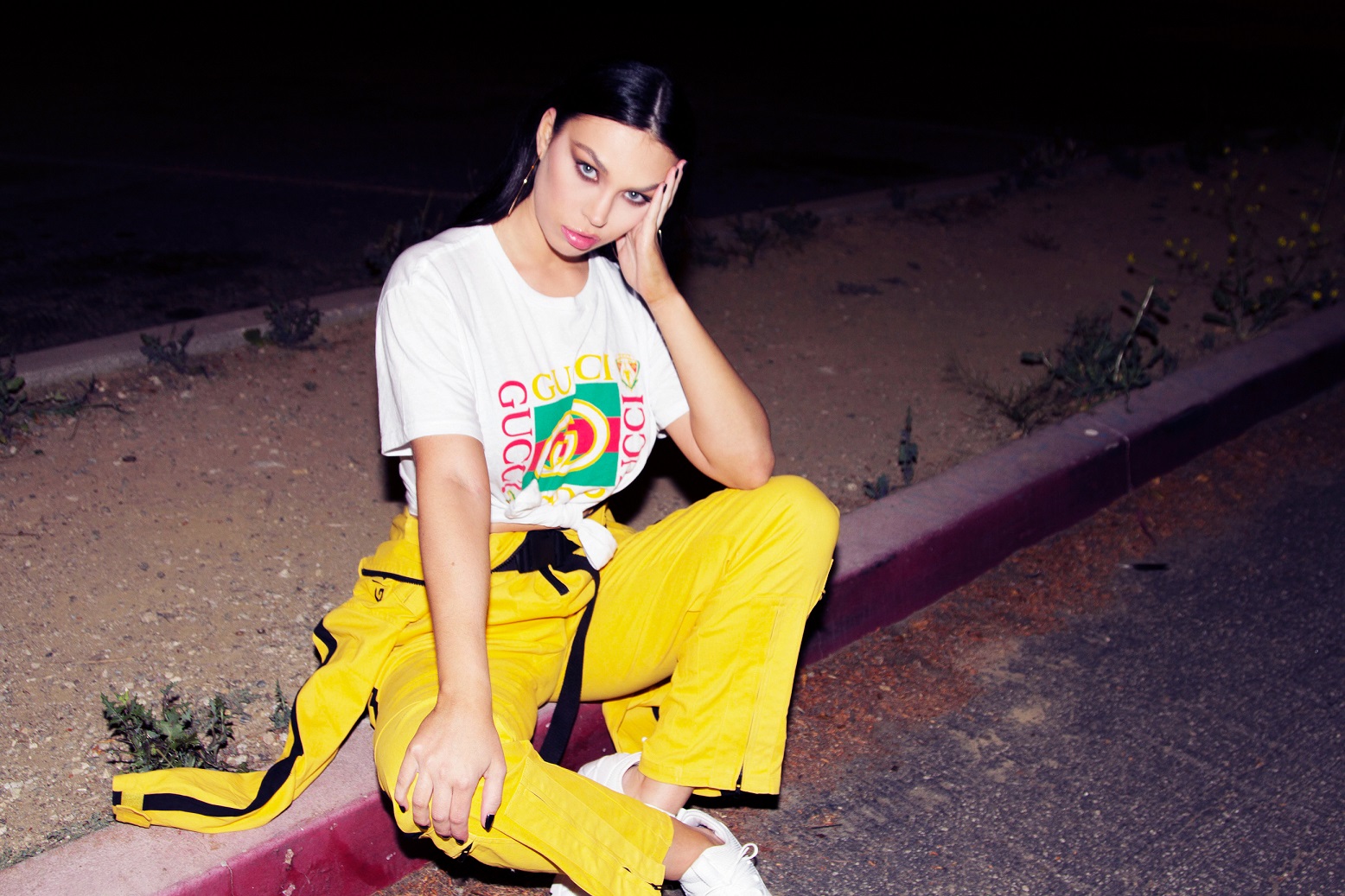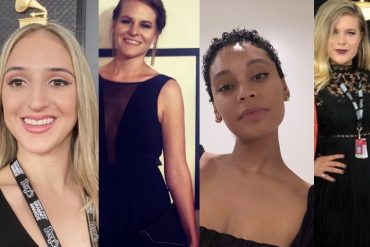Novo Amor’s Ali Lacey reflects on ten years of musical world-building, his inspiring (and slightly harrowing) journey to Antarctica, and his third studio album ‘Collapse List,’ a breathtakingly beautiful, vulnerable, and liberated indie folk record that teaches us that fragility can be stormy and turbulence tender.
for fans of Bon Iver, Gregory Alan Isakov, James Vincent McMorrow
Stream: “Years On” – Novo Amor
I’m waiting on my dreams to come and get me, ’cause hell, it’s been a ride…
Every time Novo Amor releases music, I’m brought back to the literal meaning of his name: New love.
It’s unspecific, yet intimate and universal; a feeling, as much as it is an experience – and a beautiful, wondrous one, at that. While I don’t necessarily associate acts like Green Day with lush woodland pastures (what constitutes a ‘green day,’ anyway?) or The Smashing Pumpkins with exploded gourds – and I certainly don’t parallel Red Hot Chili Peppers with their spicy namesake – when it comes to Novo Amor, the slipper fits perfectly – and it has from day one. Since his debut EP released in 2014, Novo Amor’s art has balanced “delicate melodies with beautifully expansive, minimalist soundscapes,” as Atwood wrote in a 2017 review.
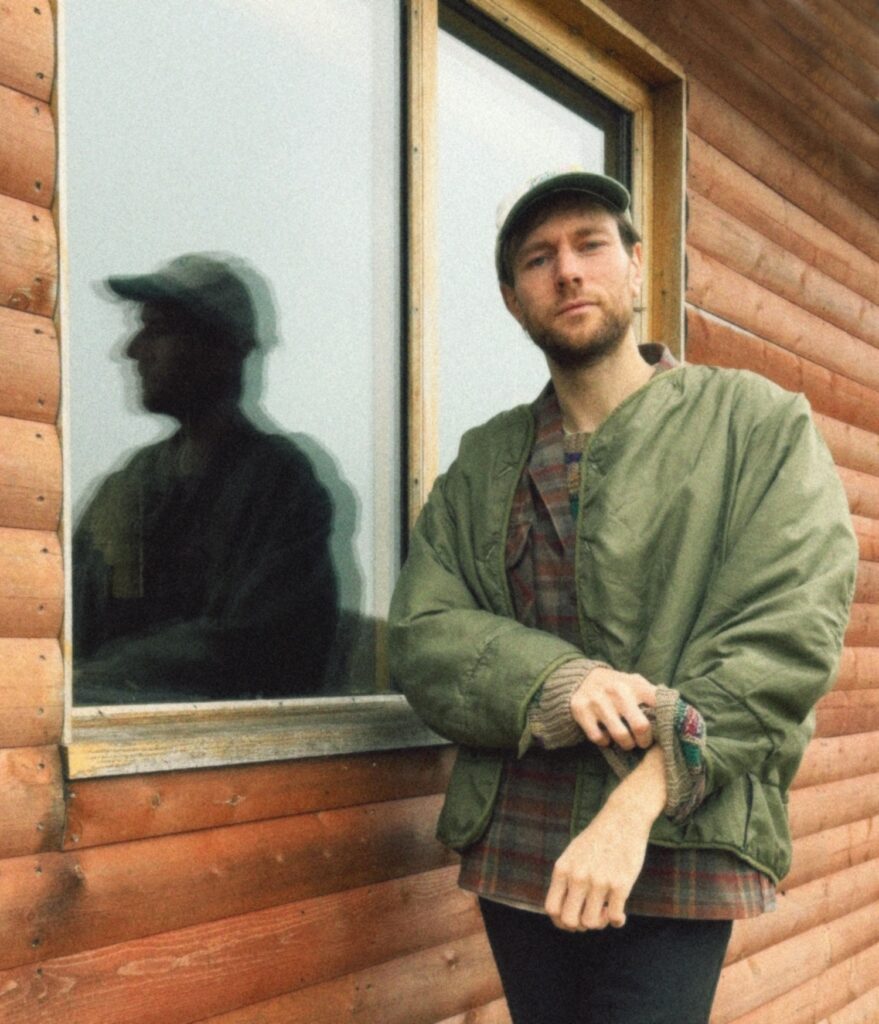
2017 saw the release of Heiress, a spine-chilling collaborative album Novo Amor made with longtime collaborator Ed Tullett (of Lowswimmer and Hailaker). “I will save your blood for years; I will brave your flood to breathe,” the pair sing in the album’s opening track, “Silvery,” their voices channeling raw, heart-on-sleeve emotions into breathtaking sound. Novo Amor’s proper “debut” album Birthplace came in 2018, and spawned such massive hits as “State Lines” and “Repeat Until Death,” both of which have garnered hundreds of millions of streams from fans around the world for their lyrical tenderness and spellbinding beauty.
His sophomore LP Cannot Be, Whatsoever arrived two years later, and declared itself the birth of a new chapter as the open-minded artist embraced a fresh start while pushing his indie folk sound into new territory. “Its honest lyrics are buoyed by a series of mesmerizing, emotionally-fueled sonics and soundscapes that flood the ears with cinematic imagery as they flood the heart with feeling,” Atwood Magazine wrote in a 2020 feature, calling it a “wellspring of bright light and energy compared to Birthplace‘s more subdued, ethereal, and perhaps “hazier,” melancholy stature.”
“If Birthplace is the countryside, then Cannot Be, Whatsoever is the city,” Novo Amor previously told Atwood. “It’s not exactly my roots, but it’s where I’ve been for a long time.”
Ten years ago, it was “subtle, quietly enchanting layers of guitar” and “lush, raw vocals” singing “hauntingly intimate and vulnerable lyrics” that formed the foundation of Novo Amor’s stirring indie folk artistry.
The solo project of Welsh multi-instrumentalist and producer Ali Lacey has evolved, matured, and transformed several times over since those early recordings, and yet the above words still feel relevant to his sound, and to his identity, today. If anything, Lacey has simply been diving deeper and deeper – into himself, and into his crafts as a songwriter and producer – over the ensuing years.
“It’s like a rite of passage; you have to just keep making and keep showing people your work, and you just get more and more accepted or not with time,” Lacey shrugs, reflecting on his first decade in the music industry. “It’s taken a while for me to understand how to walk that line properly, to be creatively true to myself and still enjoy making music without it being like, ‘this is now just a job and I had to fulfill albums or whatever.’ I think my skill set obviously has expanded by a lot – I have a better studio space, and I know more of what I’m doing.”
The four years since 2020 have been particularly transformative, eye-opening, and grounding for Ali Lacey. In 2021, he sold his house and studio and left Cardiff’s city life for the Welsh countryside; he and his dad spent the summer and fall renovating the stables on the property into a recording studio, which he now uses regularly. In 2022, Greenpeace invited Lacey to travel with them to Antarctica as an influencer of sorts, and he accepted. The three-week trip was inspiring in more ways than one – while it spawned a few live performance videos and the gorgeous instrumental album, Antarctican Dream Machine (recorded entirely during the trip), it also helped a once-stagnant and frustrated Lacey rekindle his love of songwriting.
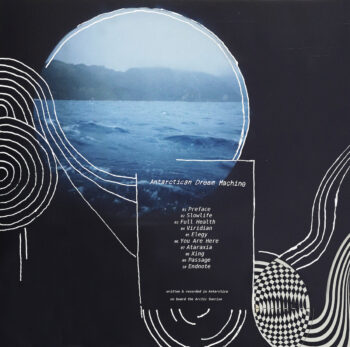
As he tells it, “That got it all flowing again. The move up from the city definitely inspired a lot of this new music, realizing that I didn’t need to be there, and it wasn’t really helpful for my life. And I lived on my own. I think I was quite lonely a lot of the time, to be honest. But then, the person I moved in with at the house I’m currently sat in, it didn’t work out. They left, and it was another big turning point in my life of, I guess, noticing things that need to change and signaling what I need in my life and where happiness is really going to come from, for me.”
Released April 5, 2024 via AllPoints, Collapse List is Novo Amor’s most intimate and expansive album to date: The product of friction and turmoil both within and around Lacey, all of which finds itself channeled into his soul-searching lyrics and feverish, emotionally charged sound. These songs hit harder than any from the artist’s arsenal, their intensity borne from painful realities and an aching weight deep inside.
“I guess the album is a lot of that upheaval from the city, from that relationship into hopefully trying to grow into the ‘me v2,’ I guess,” Lacey reflects. “Any time an artist releases an album, it’s always about their own personal growth, really. It’s all just timestamps of their life, and that’s all this is, really. It’s just what I’ve been through the last couple of years.”
That’s all this is, really. It’s just what I’ve been through the last couple of years.
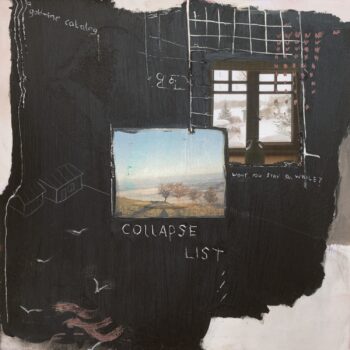
Collapse List teaches us that fragility can be stormy and turbulence can be tender.
The journey from the album’s cathartic and liberating opening track “First Place” to contemplative closer “Just Another Way” is as beautiful as it is breathtaking – a moving, soul-stirring adventure through warm landscapes and wondrous worlds filled with achingly emotive vocal performances and stunningly expressive instrumental work.
Introspection and human connection have long been core tenets of Novo Amor’s artistry, and throughout these eleven songs – especially on standouts like “Years On,” “Me v2,” “Co-Pathetic,” and “Same Day, Same Face” – Lacey plunges inward in attempts to connect not just with the outside world, but with himself. “I’ve been going on and on for all these years, hell, what I wouldn’t do just to make a sound, make it real loud,” he sings with heartrending care and conviction on “Years On.” “My god, I can’t stop it, I’ll let it win. I bet it won’t mean a thing; you said it don’t mean a thing…“
Of all the worlds he’s built within this record, Lacey says that’s the one he’s the most proud of. “I don’t think it’s gonna be for everyone, and I think I haven’t nailed it completely, but I think it’s melodically really beautiful and I think the synth riff is really interesting,” he smiles. “I think strings are just really beautiful instruments, so having all that together just makes a really special song for me.”
Atwood Magazine recently caught up with Ali Lacey for a candid conversation looking back on Novo Amor’s first ten years of existence in order to understand where he is today, with the release of his third studio album fresh on his mind and an upcoming North American tour still ahead. Dive into the wondrous world of Collapse List and get to know the artist behind this breathtaking record in our intimate interview below!
Novo Amor’s 2024 North American headline tour begins in Santa Ana, California on September 4, and will find him traveling throughout the United States (with Canadian stops in Toronto and Montreal) before he concludes a month later at The Bellwether in Los Angeles. Find tickets and more information at novoamor.co.uk!
“I’m not trying to dream too big here,” Lacey shares. “I’m just a kid who got really obsessed with music and sounds and is very detail-orientated, and just kind of leaned into that a lot. A lot of things culminated into me being able to be here and who I am today… So I just feel very fortunate to be here in the first place. I’ve already exceeded my expectations, if anything. It’s just a bonus, really.”
— —
:: stream/purchase Collapse List here ::
:: connect with Novo Amor here ::
Stream: ‘Collapse List’ – Novo Amor
A CONVERSATION WITH NOVO AMOR
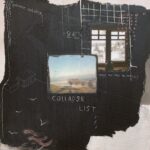
Atwood Magazine: Ali, first of all congratulations on the release of Collapse List! How does it feel to have this record out in the universe?
Ali Lacey: It feels obviously good as you’d expect! It’s probably the least exciting of all the records, but I think that just comes with the natural cycle I’m realizing of make a record, release a record, make a record, release a record, and it’s less ‘wow this is new and exciting!’ It’s more like I’ve settled into what having a music career is really like, I guess, but I do think it’s my best record and my most mature, so I think I’m actually showing people the best part of me. I think it’s maybe the proudest I’ve been of a record, so there’s that. I feel generally really good about it.
Novo Amor celebrated 10 years recently. From solo records to collaborative albums, instrumental LPs, and beyond, this project has had plenty of ‘iterations’ along the way – each of which has allowed you to test the waters, working as songwriter, producer, engineer, and more when it comes to music creation. How does the Novo Amor of today, 2024, compare to the Novo Amor you started out?
Ali Lacey: It’s such a hard thing to compare. 2012 was the very start; I really count it from 2014 when I released the first proper EP. Everything before that was just embarrassing – cringe songs about being broken up with and hoping she’d notice me, you know. So it really started to feel like a real thing from 2014. But even like listening back to that stuff now, it feels really immature. And like the lyrics, like, oh, God… but that kind of thing flew back then, that felt fine. And it was a steppingstone to getting where I am now. And it’s like a rite of passage, you have to just keep making and keep showing people your work, and you just get more and more accepted or not with time.
So I’ve changed in that I think my skill set obviously has expanded by a lot – I have a better studio space, and I know more of what I’m doing. But I guess along with that comes more pressure and demand for the music. It loses an edge of like, ‘hey, I’m just pissing around having fun’ now. I hope people like this. It’s like, this is a fully fledged music career, in a way. And it’s taken a while for me to understand how to walk that line properly, to be creatively true to myself and still enjoy making music without it being like, ‘this is now just a job and I had to fulfill albums or whatever.’ It’s really hard for me to say how I’ve changed, how different I am from that person from 2012. I’m very different. I don’t know… I don’t know how to answer it, really.
I see what you're saying, though. It's hard to quantify maturity, especially when it comes to a career that is who you are. It's you.
Ali Lacey: Recently I listened to an audio book called 4,000 Weeks. It was basically talking about how that’s essentially what we have in our lives, 4,000 weeks, and it’s an incredibly small amount of weeks, in my view; I was like, oh my God, is this really it? And I have maybe 2,500 more, maybe. But it was pointing towards that people do a lot of things for future satisfaction. You’re working on something right now so that you can work on X so that you can achieve Y. And I kept realizing that the last 10 years, that’s what I was doing. I was working on X so I can achieve Y. And then Y would come around and there would be a Z. And then I’d get to that Z and then there’d be an A or something. And it’s a full circle around.
And I’d be like, ‘Yeah, but I need to do this’ or ‘Yeah, but I want to do that.’ I think I noticed that with playing live a lot, that it’s not where I’m from. I’m very much someone who loves being in the studio and making music and just being creative. I didn’t cut my teeth on a stage and picking up an acoustic guitar, that wasn’t where I’m from. So it’s been a struggle for me to get on stages and really turn this into something that is part of my career. And it’s always been like, ‘Okay well, if I do this, then I can… If I play at this big festival and if I play at that big festival, then I can do this, and then if we’re selling 3000 tickets on this show, then maybe next time we come back, we can do 4000.’ And then, I get around to doing these 3000 cap shows, and wow, well this is incredible.
I reached this point, it’s like, why am I doing it? If I feel maybe uncomfortable in this position anyway and I want to be at home, then what the hell is it all for? I’m really appreciative of my fans, all these people coming out to see the music. But it’s a side of the career that I didn’t really expect. I just wanted to make music. And my point is that I’ve just been learning a lot about what I need to do in the now to make me at peace and find real happiness – if that exists.
You're about to start your tour.
Ali Lacey: And that’s the thing with making commitments a year before you have to actually go and do them… It’s tough.
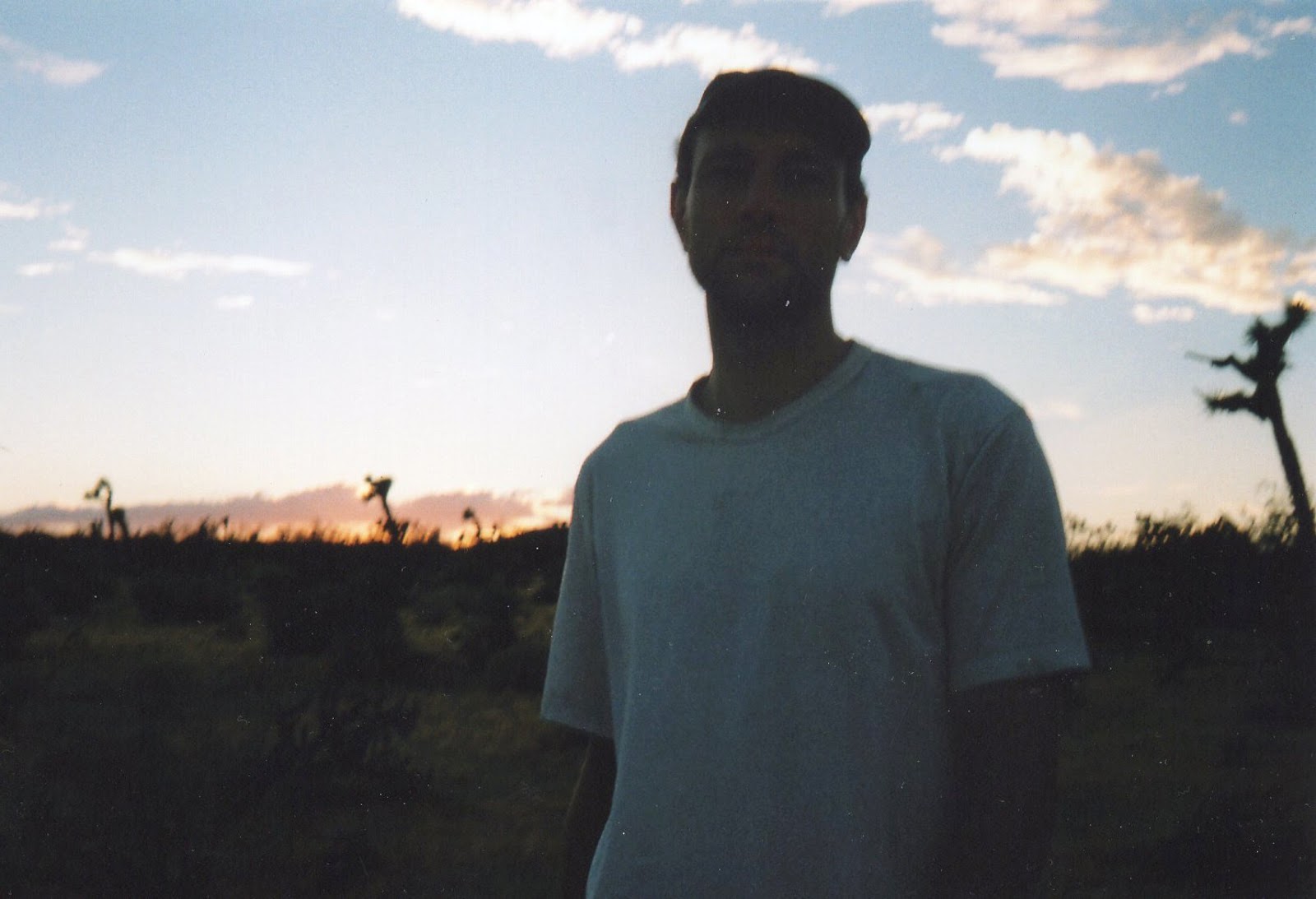
Are you excited to bring your music to a live arena? Is what you're saying that you're trying to find your voice on the stage as well?
Ali Lacey: Yeah, I think so. Roundhouse, I am excited for that achievement for sure. And it’s like 3100, I think. And it sold out pretty quick. So, there’s like that side of my career is like, ‘Wow, we’ve done really well and that’s really cool.’ And I’m stoked on that. I’ve never been to see a show in the Roundhouse. But funnily enough, when I started making Novo Amor back in 2012, I was meant to move to London – I had a girlfriend then and I was very much in love and we broke up and I wasn’t happy about that. And it wasn’t my choice. She moved to London, and then we broke up basically at that point, as she got the first day of her new job at the Roundhouse. I wrote a lot of songs about her and all of that, and it’s just funny to be going back there now and to be standing on the stage.
It's a funny achievement, considering what it used to represent to you.
Ali Lacey: Yeah, exactly. No hard feelings to this person anymore. It’s all fine.
I want to dive into your music, as it's been four years since your last pop-related studio album and two since Antarctican Dream Machine – which, by the way, is a great record, especially for life’s quieter moments.
Ali Lacey: Yeah, I get it. It’s kind of functional. I understand it’s instrumental and it’s just capturing a vibe or whatever.
But obviously, this new album came out of a very different place than Cannot Be, Whatsoever four years ago. Can you talk a little bit about where this album takes off?
Ali Lacey: As soon as I finished Cannot Be, Whatsoever, it was nose-end of the pandemic. So that, the pandemic, gave me a couple more months, a couple more weeks to work on it, really, because I was meant to go on tour in China, which obviously wasn’t going to happen at that point. And I still had some ideas. I had some ideas I started working with because I was like, ‘well, the tours are cancelled and I’ve just made this album. I don’t have hell to do and I’m stuck inside.’
So the songs “Same Day, Same Face” and “Years On” came out of that period straight after Cannot Be, Whatsoever. I came up with these little melodies and I had no idea what to do with them. I just sat on them for a while because a couple of months later, I ended up selling my house and my studio and moving away from the city, moving up to the countryside with a girlfriend. I bought a house with some stables on and I spent eight or nine months renovating, knocking that down, renovating that into a studio, which is what I use now. And during that time, I basically didn’t really think about music very much. I was enjoying four or five days a week in the summer, helping build with my dad. It’s just me and him, renovating this thing.
So I started to feel very removed from music. Then once I got back in there, it was time to pick it all up, and then suddenly I went to Antarctica! That was the first music I made since Cannot Be, Whatsoever. And I was honestly feeling… not like writer’s block, but feeling stressed about having just built this massive studio and having to make an album and nothing’s really coming. And as I’m sat in this big room with instruments, basically like I was in my old flat, it was like I just moved those feelings to this new place now.
Antarctican Dream Machine was a really good exercise of ‘I’m here for three weeks on a ship with a minimal set up. Just whatever you make is going to be what the album is.’ You don’t go away and add all these vocal layers, add all this stuff up. It’s just whatever you make, that is the album, and that’s going to be what it is. So I did that! That’s the first time I’ve ever worked so quickly. And I think that got it all flowing again. The move up from the city definitely inspired a lot of this new music, realizing that I didn’t need to be there, and it wasn’t really helpful for my life. And I lived on my own. I think I was quite lonely a lot of the time, to be honest.
But then, the person I moved in with at the house I’m currently sat in, it didn’t work out. They left, and it was another big turning point in my life of, I guess, noticing things that need to change and signaling what I need in my life and where happiness is really going to come from, for me. I guess the album is a lot of that upheaval from the city, from that relationship into hopefully trying to grow into the “me v2,” I guess. I think I feel like any time an artist releases an album, it’s always about their own personal growth, really. It’s all just timestamps of their life, and that’s all this is, really. It’s just what I’ve been through the last couple of years.
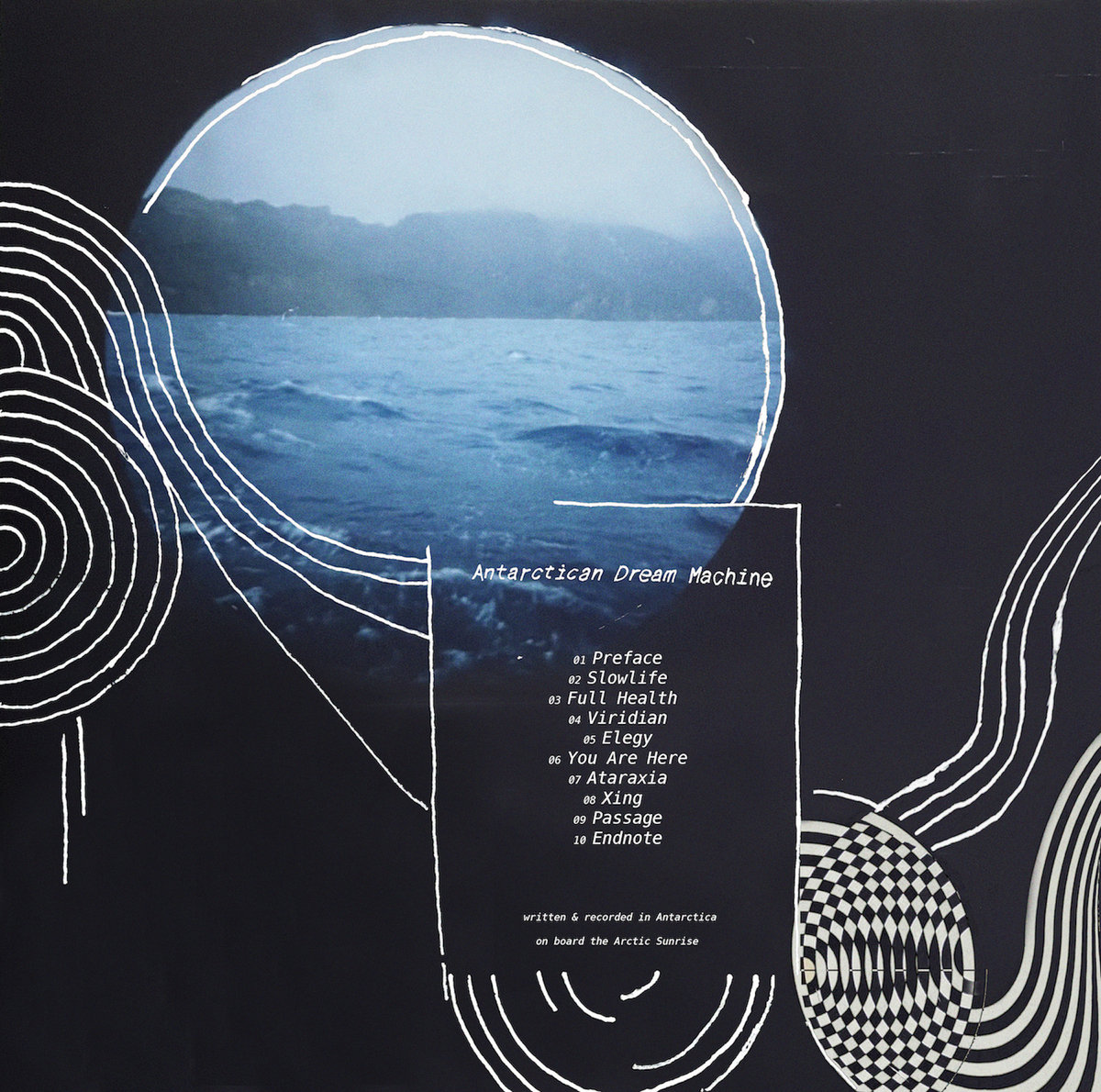
Out of curiosity, it takes a special person to want to take the voyage to Antarctica. It is dangerous; it is tough mentally, physically, and emotionally. What inspired you to make that trip?
Ali Lacey: I was asked to make the trip! Greenpeace reached out to me. And after doing a couple of environmentally focused music videos, they were kind of like we were on their radar and being like, hey, is this something you want to do together one day? And we’ve been like, trying to figure out what we could do and how we can help each other. And they said, we’re going to Antarctica on a research vessel to research penguins and like check out their populations for basically to gather information, to show the UN about how we need to save Antarctica and just not let people down there, basically. And to look off to the planet. They were like, I wanna go. And they said well, why? Why would I be there. Why give the space to me when you could just take another scientist or something. There’s like 30 spaces onboard, there’s like 15 of those who are crew of the ship and then 15 were Greenpeace people, videographers filming something that leaks… That was me and some other people, photographers like documenting penguins. So they basically asked if I want to go down there basically bear witness to what’s happening, post about it, and almost be an influencer for them. That’s how they put it as a me as a key influencer which is kind of like laughable because it’s not really what I am.
And they basically wanted me just to post about it and then just try and do some creative content while I was down there so I did like a live stream from the ship to times square in London and then I did a filmed live session on a rock next to these glaciers, and then that only took like a day or two. So my time there, I went to some islands a couple of times to see the penguins, it was all really exciting I just was capturing audio and things, and then I was in my bunk for days and there’s this bar nothingness around – just blue and white and grays. There’s no foliage or anything, and there’s basically no internet either, so it’s just kind of nothing; I just turned to my headphones and making music as something to do and something to keep me sane.
I was full of inspiration from the kind of place I was at, so I was just making music every day and I ended up making that, and it didn’t really have a plan to make it when I went down there. So it just kind of naturally occurred.
How many days how long were you actually living in Antarctica?
Ali Lacey: I think it was 21 days. It was three weeks total – I had to fly from the southernmost southern part of Chile down to King George’s Island in Antarctica, and then from there… to go to the ship, yeah. On the way up, on the way back to Chile we went through the Drake Passage, and that was a three-day voyage. Everyone’s like, ‘oh it’s scary, you’re not gonna like it, blah, blah, blah.’ And then I started Googling it, and there’s something like 800 shipwrecks at the bottom of the Drake passage, and 20,000 sailors have died crossing… it’s like, ‘What the hell!’ But I think this is all from back when ships were wooden and pathetic. I think it’s so treacherous because it’s the only place on Earth where the wind circles the whole globe without there being any land mass. So it’s the only space where wind can just keep on going around and around. This sea is really bad, and yeah,, everyone got seasick, the chefs couldn’t cook, so everyone was pitching in.
I was for two days straight basically just trying not to puke. It was fun – I kind of enjoyed it, I like a little harrowing situation if I feel like I’m gonna be okay. But you know, I shared my cabin with the ship’s first and second engineer, and he was a 32-year-old Korean guy, really friendly, kind of broken English, so we couldn’t completely talk, but he was really funny and friendly to me. That was one reason why I decided to make the album instrumental, because I couldn’t really sing with him in the room – I was just wanting to work on stuff.
I guess the more poetic thing to say is that the landscape leaves you speechless, but it’s not as true. Anyway, just a quick story, he said to me, ‘if anything goes wrong in the night, I’m the engineer, I gotta go and fix it, so there’s an alarm on the wall and it’ll go off and just ignore it, don’t worry about it. If it’s bad, I’ll come and get you.’ So a couple of times it did go off, and then one night as we were going through the Drake Passage, it was like 2:00 in the morning and the alarm went off and it sounded different to what I’d heard before. So I was like, ‘Okay, this is fine,’ and it wouldn’t stop.
And I heard a lot of hustle and bustle outside my room, and I was right down by the engine. So I could hear people getting kind of frustrated, almost scared. I didn’t listen to what they said in this situation, but do I put on a life vest? What clothes do I put on? What do I do here? I should have listened, goddammit. And I was thinking, ‘okay, I put my pajamas on, and I went out the door, I was like, is everything okay?’ And the captain was there looking kind of worried and talking to the engineer, and he was Spanish and had broken English. And he turned to me, he was like, ‘go to bed.’ I was like, okay, okay, it doesn’t seem good, but I’m just going to go to bed. I put my noise canceling headphones on, so I’d just, I don’t know, drown, I guess. And I woke up the next day, and I guess everything was fine, ’cause we were just floating along the sea.
And then I saw my roommate having breakfast. And I was like, ‘what the hell happened?’ And he was like, oh man, a seawater pipe burst in the engine room and was letting in water from outside into the ship, and it was starting to fill up the ship, basically in the engine room. So he was having to go down there and hold the pipe spraying seawater over him while someone was welding it up. And I was like, ‘oh, is that dangerous?’ He’s like, yeah. If we hadn’t attended to that, we would’ve just all drowned. So it was scary to be in those situations when you realize how fragile the ecosystem you’re living in, within that boat, is. And how harsh the ecosystem around you is.
What a story, thank you for sharing it; I can imagine Greenpeace could never have asked for anything better than an album with the actual name ‘Antarctica’ in it! Now, that brings us to Collapse List. Why that title?
Ali Lacey: There’s a podcast called This American Life, and they have a series called S-Town. And basically in that podcast, there’s a guy who is, he lives in this small town in Alabama, and you know, he sees it as a shitty little town and he thinks there’s been a murder there. So it’s like unsolved and just been like swept under the rug by this small town. So he kinda gets in touch with the podcast saying, Hey, can you come and investigate this? We think, I think this has happened. Like, you need to do something about it. And they’re like, oh, it sounds interesting. We’ll go investigate. And like they go down there, they meet him and they start investigating and they realize that like, there’s been no murder. But you know, this guy adamantly thinks there is, but the podcast becomes more about this guy and how much of an interesting character he is and how he’s kind of never left this small town, even though he’s incredibly talented.
He’s a doomer, with a nihilistic view of the world. He is just kind of too smart, I guess, and knows too much and wishes he had left, but never did. And he just sees these people around him and almost feels above them, but feels a sense of caring to his community. But, in the series, they become friends, and it’s a long series; he ends up emailing the journalist a couple of times with these lists of things that are wrong with the world and all these things that need to be fixed, like social, economical changes and environmental changes and everything he thinks is wrong and how they should be fixed. And he would label these lists “collapse lists.”
So he would just send him these different collapse lists, and while making the album, lyrically, it started to kind of lean into all these things that I was recognizing as a change in my life. I felt like I was almost narrating my own collapse list. It felt like an appropriate title for me, so I just called it that.
One of the things that I took from Collapse List, especially compared to Cannot Be, Whatsoever, is that I felt your last album was gentler, softer, sweeter – and there's a bit more friction on Collapse List, which I suppose might make sense due to what was going on in your life at the time. Do you sense that friction in these songs? Do you sense that angst?
Ali Lacey: I guess you could say so. Yeah, it feels less like a pop record than Cannot Be, Whatsoever, even though that’s not necessarily ‘pop’ or whatever. It’s less pretty and there’s more dissonance and there’s more obvious shifts. Take the third track “Placeholder,” how it literally starts with this massive pitch shift on the strings that turns down; things like that, I guess. Maybe there is some more grit to it. It hasn’t been intentional, I can you tell that; it’s just been what’s happened.
It's so much fun to hear you grow not just as a lyricist or a vocalist, but as a producer and as an ‘aural architect.’ You’re building these incredible sonic sculptures. Are there any tracks on the record that you're particularly proud of when it comes to the landscape that you created?
Ali Lacey: I really like “Years On.” I think it’s one of my favorite things that I’ve ever made. I don’t think it’s gonna be for everyone, and I think I haven’t nailed it completely, but I think it’s melodically really beautiful and I think the synth riff is really interesting. I think strings are just really beautiful instruments, so having all that together just makes a really special song for me.
You’re the author of my head
And I wouldn’t light up the room
See, it’s awkward if I’d said
that I wouldn’t sit back and lose
If I gotta be there for me
(death, be on time for me)
‘Cause I’m kind feeling there, fully
(let me unwind, fully)
You’re out on the border, where time left
And I shouldn’t care like I do
But I’ll be going on and on for forty years
Saying “Hell, what I wouldn’t do
just to be around, feel better now”
My god, I can’t stop it, so let it ring
I bet it won’t mean a thing
You said it don’t mean a thing
It's not easy to build a song like that – one that starts so soft and so emotionally and builds throughout. It's not simple to create an experience like that.
Ali Lacey: It really feels like a journey, that song compared to a lot of others, and it’s still only what? 3 minutes 30, and it circled back ‘round to the riff. I like how it falls back down to that. “Hotel / Easy Feeling” is another one I’m proud of, even though it’s just the most throwaway on the whole album really, ‘cause it’s the one I recorded while I was waiting to go down to Antarctica. I was in my hotel room in Chile to do an eleven-day quarantine. I wrote that and recorded it in that time, basically in a day or two. I didn’t think I’d really use it; I just did it as a demo, and then when it came to making the album, I think I just pitched the whole thing down a semitone and then just said, I’m gonna use that as it is. It is my favorite one to play live, and it’s surprising because I’ve put it up as a full band, so it has a lot of energy. It’s gonna feel very different! Other than that, “Co-Pathetic.” I just like the guitar riff, that’s it.
I was so taken by Collapse List’s opening track, “First Place,” when you sing, “Wouldn't know if it kept calling, my melatonin isn't forming, was kinda hoping you wouldn't notice I had a moment. Should I go if I get bored of being lonely?” It's such a powerful way to kick off the album, and it feels very intentional. I was wondering if you could talk about putting that song first, and the significance of that entrance.
Ali Lacey: It’s kind of funny; the last album started with the words ‘I knew,’ and then this one starts with the words ‘I wouldn’t know.’ It’s kinda like I’ve gone backwards a little bit. That song’s opening from where the last album starts ‘I knew,’ and the thesis of the song is, ‘I feel like I’m finally me.’ I guess it’s me saying, ‘Well, do you ever really feel like you’re finally you?’ Is it always expanding and growing? Now I’m at this album, questioning that, and now feeling like a new me, and that’s what happens. It definitely feels like a first song for me, I think out of the whole album, it’s maybe the one that speaks most to, at least lyrically, the upheaval and realizing that I’m ‘setting free’ or whatever; I’m changing.
‘Cause damned if I won’t be digging in my heels
Coalescing every other ending
I’m waiting on my dreams to come and get me
‘Cause hell, it’s been a ride
‘Cause damned if I can’t be all that I would need
It’s a lesson, one I’m never learning
Who have I been kidding?
I’m dealing with it all alright
I’m setting free (I’m setting free)
I’m setting free…
In addition to these favorite sonic moments that you talked about, do you have any favorite lyrics that really stand out to you, that you're particularly proud of?
Ali Lacey: I like the second verse of that song, “Shoulda known it’d get boring in the hellscape, I was first place to the coffin in the garden, it was creaking…” I think they mean something to me that people are never going to pick up on. And also “Hotel / Easy Feeling” – I just like all of the lyrics, I think it makes for a good… more like a ‘playing gravy’ song, I think.
“You kinda messed with my rhythm, where's the rest of my life gone? I could've sworn I had a couple more minutes left. I had a speech prepared, but all I said was ‘don't leave just yet’”… That was another one that I'd actually written down in advance to talk about, so I'm glad to hear that it resonates for you, too.
Earlier, you mentioned “Me v2.” I want to touch on that song, because it feels like one of the other thesis statements on the record in a lot of different ways.
Ali Lacey: I rarely go into writing songs or lyrics with what they’re about in mind, or what I want to write about. I’ll kind of just, a lot of the time at least just kind of mumble syllables and things that sound like words and then try and fit things to what sounds like I’ve already said and say, oh, it sounds like I’m saying that. Why don’t I say that? And then think what does that kind of sound like it means? And like, oh yeah, it could relate to that. And then maybe write the rest of the song based off that. And how does that song start? I was late. I was late on my second wave…
It was basically me saying that I feel like I was late to that second chapter of my life that a lot of people around me are achieving. I’ve got people around me getting married and having kids, and it’s a very normal everyday life thing that happens as you get older, and maybe I feel like I’m just late to my second wave and I’m really just coming into my own now… And maybe the next album I’m gonna be saying exactly the same thing. It’s just a realization of certain things like that, and just feeling my feelings towards people change, I think, without being too clear and obvious about it.
The line, “I was praying I could get a rewind. Could you play along? Couldn't find the time for anyone,” stood out on that song. Thinking about how time can't stand still and how we only get to go in one direction. There's a certain acceptance as we’re coming into your adulthood, especially as we get out of our 20s, go through our 30s, and that's where everything really changes, right? Everyone is suddenly in a new world, new environment, married, children, jobs… Everybody goes off the rails and in different directions, and it's tough! You realize we're all on our own worlds.
Ali Lacey: I deal with a lot of indecision in my life. I’m very bad at making decisions, and I think I’m realizing that comes from people wanting to live multiple lives. Like, you never know which way is the correct way to go or how it’s gonna work out, so you tell yourself you want all these things. And the only real way to have an actual peaceful life is to write down the ten most important things to you that you want to get done in your life. And then throw away the last five and just do those first five, or the top three or whatever, and just be at peace with your own fate. It’s not that I believe there’s any higher being telling me how I should be. But the acceptance of, ‘well, you can only do this one thing. You can only do this…‘ I’m always praying for a rewind or ‘can I redo that?‘ or ‘can I change that?‘… I wish I didn’t do that. It’s not really an acceptable way to live, to be honest.
Maybe, but I think what's really nice is that, in putting it into your art, it gets reflected to everybody else to remind us that we're not alone in feeling this way, either. And there's somebody who felt it so deeply he put it in a song.
Ali Lacey: Yeah, true.
So I do think there's something valuable about that. Even the idea that this entire record is called Collapse List, and it was one person's list … I know you don't go into these things with that kind of overarching concept record in mind, but at the same time, it is nice to have a bow to tie them all together and to think about where you were at that moment in life or over the past couple of years. And when the shoe fits, it fits! What do you hope listeners take away from this album, and what have you taken away from creating it and now putting it out?
Ali Lacey: I always just hope listeners enjoy it. If they don’t, then that’s okay. Go listen to something else. I’m trying not to let what people want dictate my creativity. But there is a certain amount of like, ‘oh, I know fans are gonna like this. I know fans are gonna like this,’ and that does excite me a little bit when I’m making it, because I think this is cool. I think this sounds really good. I hope they share that with me because in the end, my fan base or a group of people who like the things that I have liked because I have been in that room making that music, enjoying that, and we have that thing in common… Not that I sit around like Kanye listening to my music all day or anything like that. I want this out. But we can both resonate in the same way, in a way.
Yeah, I hope it makes them feel something. I hope they get whatever they want from it. I hope they attach their own meanings to the songs, and it helps them get through something, makes them happy or helps them cry or just whatever… Maybe motivates them to make music themselves or do something they want to do or be creative!
So much of your music in the past was touched and affected by Cardiff, which has been your hometown for nearly two decades, if not more. Do you hear the Welsh countryside when you listen to this album? Do you hear the impact of your move in the music?
Ali Lacey: Well, I feel like Birthplace, my first album, was very much about Woodgate, New York, which is upstate, rural New York. The second album, Cannot Be, Whatsoever, was made in my old apartment in Cardiff, very much in a city, hustle and bustle. I don’t really think the electronic sound of what I feel like a city is really creeped in that much. But this one is now back into the countryside, but with the city kind of behind me in hindsight. I feel like it’s taken a little bit of each of these things. Someone asked me earlier that if Birthplace was the countryside and Cannot Be, Whatsoever was the city, is the location of this album just within yourself? I was like, ‘whoa, deep.’ And yeah, a little bit. They all are, I guess. It’s just the countryside now with different eyes, really. And the album art has a picture of my bedroom window of the house I’m in right now when it snowed outside. And then the other picture is from the house I grew up in; my parents took that photo in the 1980s, of the view from the house.
I really mirror my move from the city to this place with my partner at the time. Very similar to my parents’ move from Birmingham to the Welsh countryside. And my dad also is in a very similar place. He had a studio next to his house, kind of like I do. So I kind of reflect on me almost following the footsteps of my parents a little bit.
That's so interesting. You know, I took a trip to Iceland earlier this year, and if I had to think of a place where Novo Amor's music really resonates for me, for some reason, it's out in those glaciers. There's something icy and natural about your sound. It's something that evokes grand pastures… so maybe you’ve finally found where your music has always pulled from.
Ali Lacey: I think a little bit. It’s really hard for me to put a pin into where it all comes from, to be honest. And the last time someone asked me in an interview, like, where’s the perfect place for people to listen to Novo Amor, I said on the toilet. So I don’t have answers to this stuff. And I do understand the Iceland kind of aesthetic, and branding is important. I remember when I started out, I was like, ‘I want like the music videos to be loads of just bodies of water and lakes and the sea and stuff.’ And I did that for quite a while! It really did build the aesthetic of that… I think my first five music videos were all just water.
I get it though; there's something to be said about letting art be art, and letting people take from it what they will. And if that's what I take from it, that's great! Others, yourself included, can have completely different perspectives. That said, do you think you can describe this record in three words?
Ali Lacey: I feel like in interviews this is usually where I’d say something dumb like a joke. I’m not as deep as people think; I’m not looking to say like, “hey, you need to be like curled up in a blanket watching the sunset listening to my music.” And I’m not walking around with no shoes and socks on, like Jacob Collier or something.
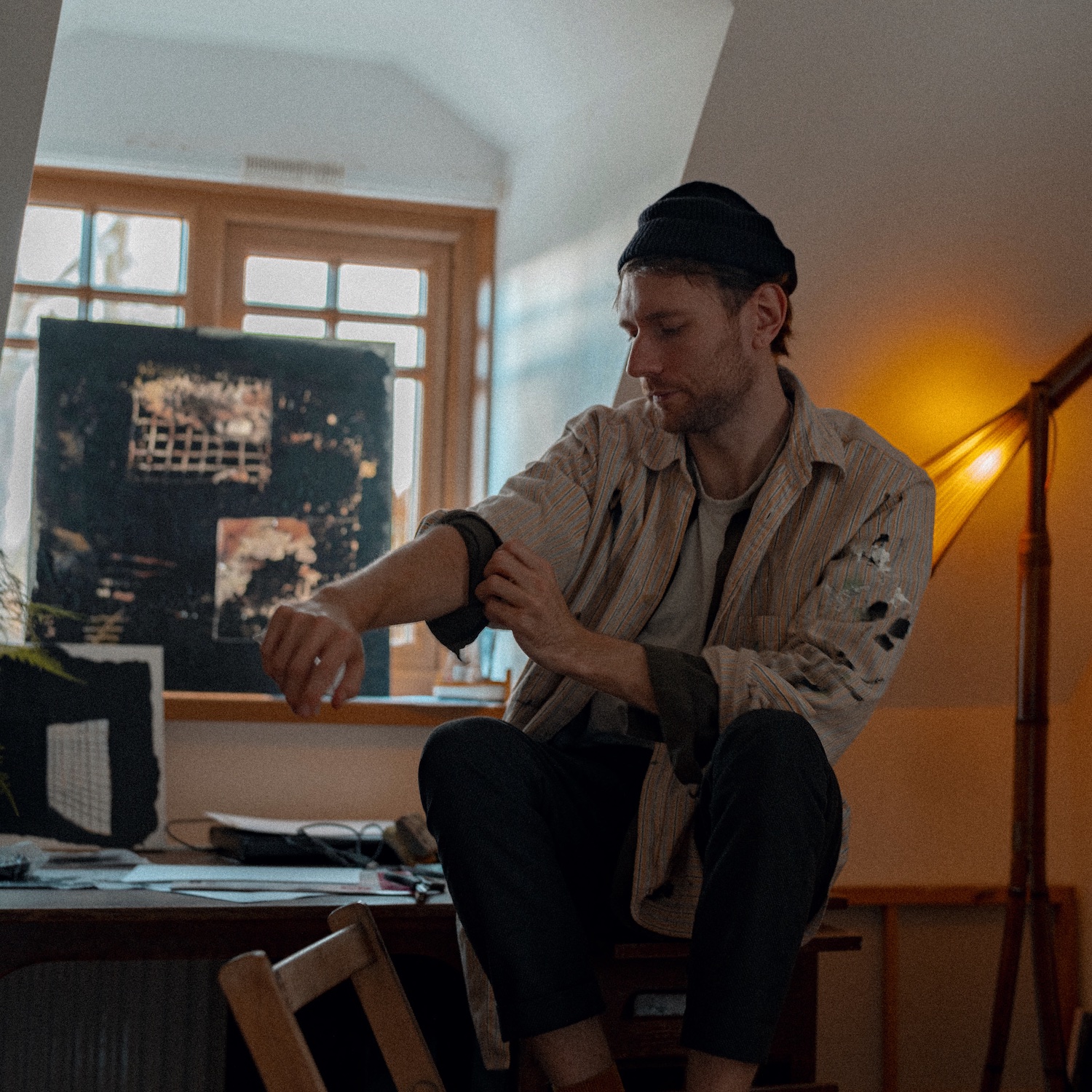
As we wrap up, and in the spirit of paying it forward, who are you listening to these days that you would recommend to our readers?
Ali Lacey: Let me have a look quickly. What playlists have I got? Songs… songs to eat ribs to? Not that one. That’s just all Buck Cherry and rock music. Stuff you’d see in a Burger King advert where the meat is dropping and there’s fire. Ah! Someone I’ve been listening to a lot recently is, okay. Pinegrove are a band I’ve listened to like a lot over the last couple of years and it’s been really inspirational for me. I just think that it’s amazing writing and I love the voice and the sound. A.G. Cook is also really cool.
Other songs I keep going back to at the moment, there’s a song called “Big Hand” by a guy called Liam Bauman, and a song called “Wherever I Am” by a guy called Ethan Tasch. I love that song and his whole album is really great. And then Frost Children, a song called “Marigold.” Those are some three songs I’ve just been really enjoying recently.
At the end of the day, are you somebody who makes the music that you want to be hearing, that you want to listen to?
Ali Lacey: Kind of. It’s more that, yeah, making sounds and just making things that I want to hear and just trying to achieve something that I think is cool and good, even though once it’s all finished and I listen to it, I’m like, ‘Well, this doesn’t align with any of my favorite artists and it’s nowhere near as good, so why have I made this?’ I guess I’m just trying my best… But it does okay, I guess.
There’s that classic Ali Lacey wit again! We're talking about Novo Amor today, having just released Collapse List and heading on multiple tours soon enough… Where do you want to see this project in five years’ time? Where would you love to be?
Ali Lacey: I guess I’m always striving to just try and make the best music that I can, and I don’t think I’ve made the best music that I ever will. So, I feel like five years’ time, I will hopefully have a couple more albums out. Maybe we would start some other projects, maybe a lot more collaborative stuff and maybe producing for some other people. But I’m pretty, I’m pretty stoked with how things have gone. I’m not trying to dream too big here. I’m just grateful for being in this position in the first place. I’m just a kid who got really obsessed with music and sounds and is very detail-orientated, and just kind of leaned into that a lot. A lot of things culminated into me being able to be here and who I am today. I know so many other musicians who are way more talented than me that don’t have a bunch of other things that are going to get them to have a music career. So I just feel very fortunate to be here in the first place. I’ve already exceeded my expectations, if anything. It’s just a bonus, really. [laughs]
It's always good catching up with you, Ali, and thank you for your time today. Congratulations on this record; I'm excited for it to soundtrack the next couple years of my life.
Ali Lacey: Thank you, man. I appreciate it. It’s good to talk to you too.
— —
:: stream/purchase Collapse List here ::
:: connect with Novo Amor here ::
— — — —

Connect to Novo Amor on
Facebook, Twitter, TikTok, Instagram
Discover new music on Atwood Magazine
© Bethan Miller Co
Collapse List
an album by Novo Amor

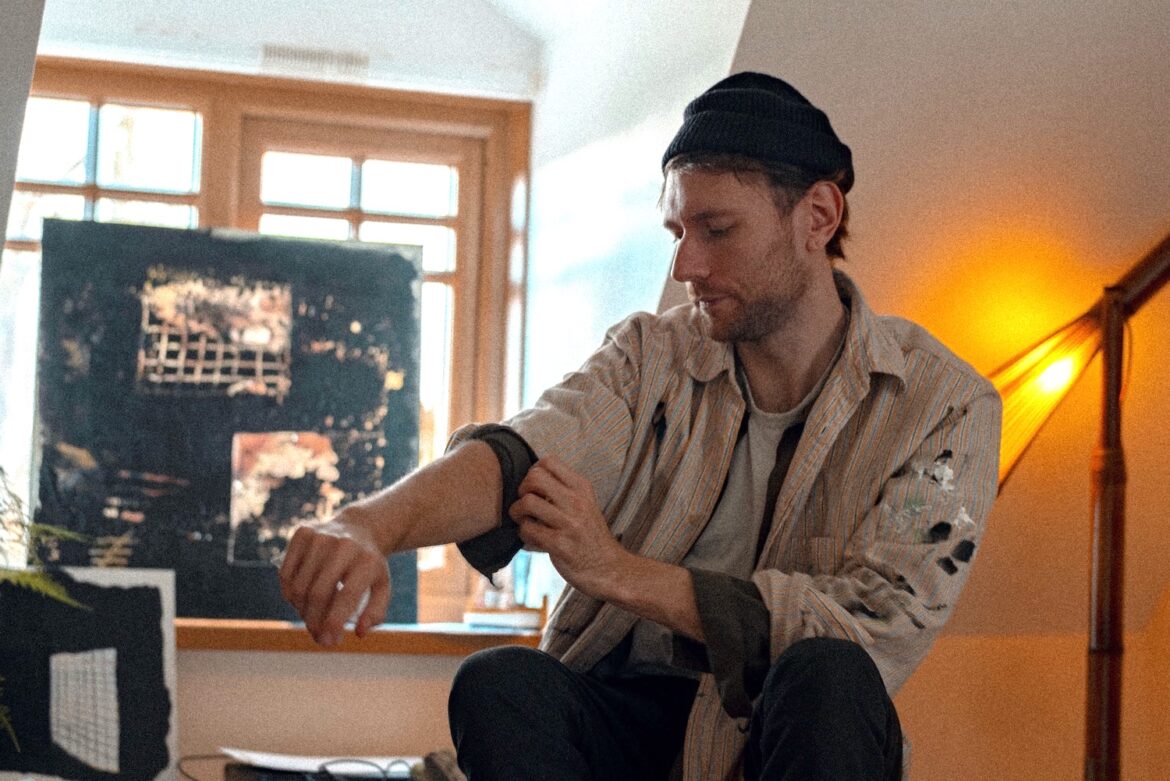
 © Bethan Miller Co
© Bethan Miller Co